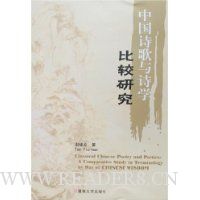基本信息·出版社:暨南大学 ·页码:416 页 ·出版日期:2006年11月 ·ISBN:7810797018 ·条形码:9787810797016 ·版本:第1版 ·装帧:平装 ·开本: ...
| 商家名称 |
信用等级 |
购买信息 |
订购本书 |
|
|
 |
中国诗歌与诗学比较研究 |
 |
|
 |
中国诗歌与诗学比较研究 |
 |

基本信息·出版社:暨南大学
·页码:416 页
·出版日期:2006年11月
·ISBN:7810797018
·条形码:9787810797016
·版本:第1版
·装帧:平装
·开本:16/0开
·正文语种:中文
内容简介 A comparative study of terminology in classical Chinese poetry and poetics inclusive of engaging topics on philosophy and aesthetics showing an old tradition with its intrinsic principles and inherent patterns in bold relief and giving the reason why the Chinese people aspiring at shen神(Perfect union of cognition and inmagination),have been psychologically disposed to harmony reconcilement and reciprocity and aestheticalyy capable of diversified tunes as well as of profound lyricism-from which is a message ringing:Prospering the nation has cherished a time-honored tradition remarkable for its highly-civilized li-yue (Propriety-and-harmony-oriented)institutions and value systems which stuck deep roots in Humanity and Sincerity;Thriving the people has cultivated an archetypally gentle honest and poetic character renowned for its spiritual depths intellectual richness and moral loftiness which their gentlemen carry in Humility and Simplicity.
A unique and compact construct with peculiarities of CHinese identity.
Fresh renditions of more than 300 items relating to major concepts in classical Chinese literary thought inclusive of Sikong Tu s Twenty-Four Modes of Poetry.
Substantial reference data for comparatists and translators alike.
目录 Introduction
Chapter One:Cycle1
Tian天(Heaven),Di地(Earth),Ren人(Man)
Chapter Two:Cycle2
Ru儒(Confucianism),Dao道(Taoism),Fo佛(Buddhism):Poetics of Transcendental Inwardness and Pragmatic Reason
Chapter Three:Cycle3
Shen神(Shpirit,Spirituality,“Realm of Pure Experience”,etc.)
Qi气(Breath,Vital Force,Formative Energy)
Yi意(Psychological Impulse,Mood,Idea,etc)
Chapter Four:Cycle4
Li理(Principle,Reason,Truth,Inherent Order Significance)
Shi事(Event Situation Process Matter Things)
Qing情(Manner of Being Human Feelings Expressiveness of Physical Objects)
Chapter Five:Cycle5
Fu赋(Narrative-Descriptive Mode;A Genre:Rhyme-Prose)
Bi比(Similaic/Analogical Mode)
Xing兴(Evocative/Associative Mode)
Chapter Six:Cycle6
Ge格(Sthle Structure; Literary Ethics:Paradigm)
Jing境(World of Poetic Visions Ideorealm)
Zhi致(Aesthetic Individuality Brilliance of Humanity)
Chapter Seven:Cycle7
Gao高(Poetic Abstraction Sublimity Highness Loftiness)
Da大(Poetic Digestion Greatness Broadness Spaciousness Magnificence)
Shen深(Poetic COnvolution Depths Inexhaustibility Indeterminacy)
Chapter Eight:Cycle8
Gang-Rou刚柔(Hard Firm Unyielding;Soft Gentle Yielding)
Xu-Shi虚实(Vacuity and Solidity)
Nong-Dan浓淡(Richness and SImplicity)
Chapter Nine:Cycle9
Zheng bian正变(Orthodoxy and Variation/Intertextuality)
Ya su雅俗(The Refined and the Popular)
Wen bai文白(The Classical and the Vernacular)
Bibliography
Index
Postscript
……




